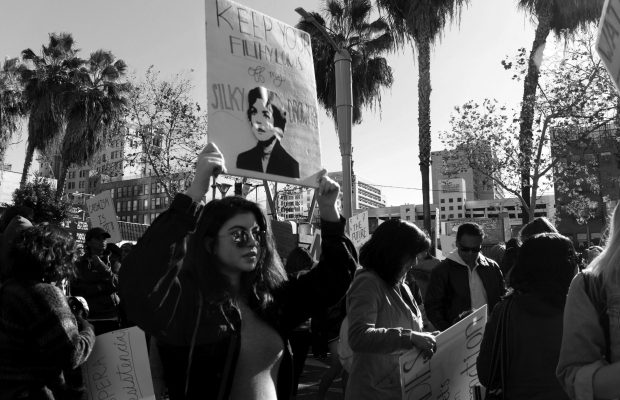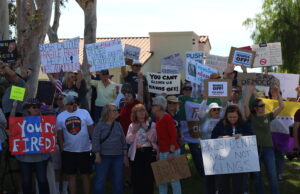NPHS students take to the street in the 2018 LA Women’s March

Over half a million people took to the streets in Los Angeles to participate in the Women’s March on Jan. 20. This event mirrored the Women’s March that occured on Jan. 21, 2017 in response to the inauguration of President Donald Trump.
Leila Latham, senior, attended the Women’s March both last year and this year.
“To me the Women’s March was just an opportunity. This year it spread awareness about voting, which is the most important thing. It also served as a way to come together with people with similar ideologies and help empower women,” Latham said. “This year I was able to take people that weren’t able to go last year. That was my main goal: to take other people, spread awareness and let them see this amazing event.”
Latham was accompanied by Rory Smith, senior and president of Feminist Club.
“My motivation for going this year was because I believe that women are equal to men,” Smith said. “It was hard not to feel empowered when everyone around you wants to do the right thing. With so many people who believe the same things, you can be hopeful about the future and about change.”
While Smith and Latham participated in the march because of the female empowerment that it represented, Evelyn Zhai, senior, and Sam Church, junior, marched because they are upset with the current political climate.
“We live in a democracy where what’s supposed to happen is our legislators and our representatives vote according to what the people believe in. When people demonstrate in marches such as these, they are sending a message to the legislators and people who are running campaigns that this is what we want in our elected officials,” Church said.
Zhai and Church have both been politically active throughout the past few years and are members of Youth and Government.
“Protesting is in our constitution, freedom to assemble. It is also in freedom to petition, and so I think that by going out and protesting, we really show the government that we have a voice and we are making them hear our voice. Protesting has been shown to historically bring about change,” Zhai said. “I honestly think that throughout history, protests have shown people that there are real people behind these movements and that it’s not just on Twitter or petty fights.”
Church stressed the importance of discussing equality to solve issues.
“I don’t think we can fix our issues unless we talk about them. I think if we don’t champion equality and feminism and that sort of thing, instances of sexual misconduct will keep occurring,” Sam Church, junior, said. “Speaking out for human rights in general–especially when people are misrepresented and not given a voice, speaking with them, alongside them, for them and advocating for all people– is essential for cultivating a society in which equality is actually prevalent.”



